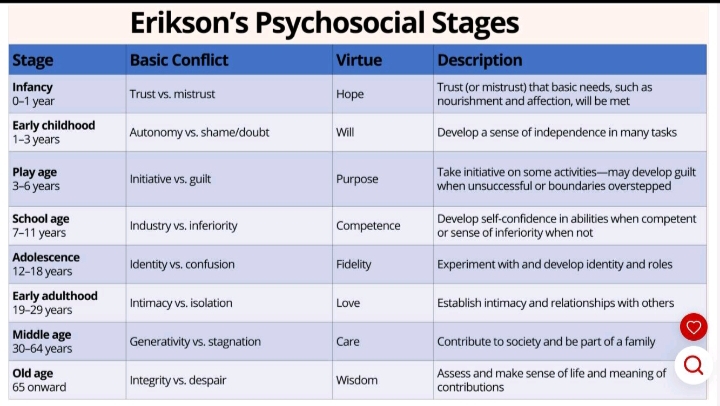What are Erikson's psychosocial stages and their corresponding conflicts, virtues, and descriptions?

Understand the Problem
The question is presumably asking about Erikson's psychosocial stages, which detail different stages of human development along with their corresponding conflicts, virtues, and descriptions. The high-level approach to solving it may involve interpreting or explaining these stages.
Answer
Erikson's eight psychosocial stages: Infancy, Early Childhood, Play Age, School Age, Adolescence, Early Adulthood, Middle Age, and Old Age. Each stage has a basic conflict, virtue, and description.
The final answer is Erikson's eight stages of psychosocial development, each with a basic conflict, virtue, and description: Infancy (Trust vs. Mistrust, Hope), Early Childhood (Autonomy vs. Shame/Doubt, Will), Play Age (Initiative vs. Guilt, Purpose), School Age (Industry vs. Inferiority, Competence), Adolescence (Identity vs. Confusion, Fidelity), Early Adulthood (Intimacy vs. Isolation, Love), Middle Age (Generativity vs. Stagnation, Care), and Old Age (Integrity vs. Despair, Wisdom).
Answer for screen readers
The final answer is Erikson's eight stages of psychosocial development, each with a basic conflict, virtue, and description: Infancy (Trust vs. Mistrust, Hope), Early Childhood (Autonomy vs. Shame/Doubt, Will), Play Age (Initiative vs. Guilt, Purpose), School Age (Industry vs. Inferiority, Competence), Adolescence (Identity vs. Confusion, Fidelity), Early Adulthood (Intimacy vs. Isolation, Love), Middle Age (Generativity vs. Stagnation, Care), and Old Age (Integrity vs. Despair, Wisdom).
More Information
Erikson's theory emphasizes the impact of social experiences across lifespan, each stage focuses on mastering a skill, affecting overall development.
Tips
A common mistake is confusing the stages or associating the incorrect virtue with a stage, so ensure correct pairing of conflicts and virtues.
Sources
- Erikson's Stages of Development - Simply Psychology - simplypsychology.org
- Erik Erikson's Stages of Psychosocial Development Explained - positivepsychology.com
AI-generated content may contain errors. Please verify critical information